- Home
- Yvonne Navarro
Species II Page 6
Species II Read online
Page 6
There was a tremendous CRACK! then something fast, large and dark went with blurring speed by and buried itself into his stomach. All the air went out of his lungs, and everything below his rib cage went strangely cold and numb, as though someone had sprayed him with liquid nitrogen. Dr. Orinsky looked down and saw with a vague sense of surprise that something ugly—like a shiny, brown hand but with barbs across its oversized back—was pulling . . . out of his stomach, and taking away with it a good portion of the internal organs that he needed to stay alive.
“Oh—not good,” he croaked. “Not . . . good.” He forgot about the traveling blood as his hands slammed over the hole in his abdomen in a belated attempt to hold in the parts of his body that he now realized were being pulled away through an opening smashed through the door that separated his lab from the medical supply room. He tried to straighten up and step toward it but staggered backward instead, unable to do anything but watch in stupefied horror at the bloody gray lengths of intestine that were trailing over the ragged edges of the opening at knee-height—
Mine!
—and the mottled, talon-tipped fingers that were clenched around them.
The breath he tried to take for a scream choked off as blood welled in his throat from injuries he hadn’t known about. He gasped and collapsed, still thankfully numb and growing more so by the moment. Perhaps the lack of pain was a blessing, but he knew he was surely bleeding to death. He didn’t have long.
Strength fading and on a fast track to death, Orinsky rolled on his stomach and dragged himself toward the far wall.
Behind him, unnoticed in his final moments, the surface of the ruby-colored blotch shifted, then shifted again. And finally crept up the door and disappeared through the fracture made by the alien hand.
5
Morning sunlight streamed over the eastern roof-line of the Pentagon, spreading across the roof and chasing away the night’s humid haze. No one, however, in this particular unlabeled conference room saw the bright, cheerful light, because there were no windows. Underground, secure in every respect, only those with the highest levels of clearance even knew of its existence.
Contrary to the images displayed in all the popular movies, the room was decorated in light colors. The Tempest-shielded walls were covered in polished ash paneling behind which was wired a sophisticated sound and video system, as well as the expected setups necessary to insure the room was free from unwanted monitoring. Telephone, video, fax and data lines were unquestionably safe, and all transmissions in and out were newly upgraded DES encrypted; as part of the nerve center of America’s defense, no one in the world who shouldn’t hear what went on in this room would ever have a chance to do so. The conference room table dated back to World War II and was original to this room. The table’s wood was the same light ash as the walls, and although it was a little worn around the edges—a lot of decisions had been made here over the decades—the piece was still sturdy and serviceable. The chairs had been reupholstered a few times, but they, too, were still functional.
Much like the four men seated in the room.
Colonel Carter Burgess turned toward the multi-sided speakerphone in the center of the table, flipping through the sheaf of papers in his hands as the other three men—Laura Baker had been overheard referring to them as the “Pentagon Three,” which had made even him smile—waited, their faces solemn and silent. Today Burgess wasn’t smiling, though—no one was.
Least of all Dr. Ralph Orinsky.
Spread across the table in all their lurid detail was a stack of eight-by-ten color photographs of the crime scene, and now Burgess tapped the one closest to him, as though the person on the other end of the secure telephone line could see his movement. “The FBI lab came up with significant irregularities in their test results,” he said, more for the benefit of his three comrades. “Thus we sent Dr. Baker samples from the Orinsky crime scene and asked her to study the DNA. Dr. Baker, if you would, please tell us what you discovered.”
One of the things he found most appealing about Laura Baker was the way she came straight to the point. No frills, no fancy words. She just went for the short and sharp, and sometimes killer, statement.
“The substance found in Dr. Orinsky’s wounds was a combination of alien and human DNA.”
“What do you mean, ‘substance’?” asked one of the men at the table. “Are you talking about blood?”
“No, I’m not. We have more investigation to do with Dr. Orinsky’s notes and the tests he was apparently running on blood samples which were found in his lab, but I’ve been advised to leave that to the FBI team and work with them if they need my assistance. Rather, I’m talking about a conspicuous amount of an unidentifiable mucouslike substance. The DNA in this substance is structurally similar to Eve’s, but it is not a perfect match. And obviously, Eve has not left the compound.”
All four men were now staring at the speaker phone as if the woman on the other end could see and interpret their expressions. “What are you saying, Dr. Baker?” demanded Colonel Burgess. “Are you suggesting that—”
“Yes, gentlemen,” came her reply. “This means that there’s another one out there.”
There was no hesitation. “How can this be?” demanded the first of the three men seated around the table. By far the heaviest, now his pudgy face had gone an unpleasant shade of pink. “Who could’ve generated one of these creatures? The Japanese? The Russians? Or maybe the Chinese—”
“Christ,” said the man next to him in disgust. His fingers ran nervously through his dull, steel-gray hair and his eyes were small and flinty.
“I don’t know who else has the technological expertise to carry out this sort of experimentation,” Laura interjected: “It is quite possible another government picked up and recoded the message originally sent to Arecibo containing the DNA code. But we’re not talking about a simple medical experiment that can be performed in even a well-equipped medical facility. These are specialized procedures that require unique equipment and machinery, much of which is available only here in my lab at Monroe. As you are all aware, the expense of this project is tremendous.”
“None of our Intelligence sources suggests that any foreign power is involved,” Colonel Burgess said with finality. “We can’t rule it out, of course, but the probability is extremely unlikely.”
The third man in the Pentagon Three team, the one who was usually the quietest and whom Burgess knew wielded the most power in this room, finally spoke. “Why do you think Dr. Orinsky was targeted?”
There was a beat of silence as Dr. Baker considered this. “I haven’t a clue,” she answered at last. “But my staff and I hope to find some answers among the research notes found in his lab. We’re still working our way through them.”
The first of the trio spoke again. “Dr. Baker, given your background with these creatures, how would we start looking for this thing?”
This time there was no delay in her answer. “Blood testing is the only way to identify the presence of alien/human DNA. Based on what happened previously, and also because we have created another form of the alien species, my team at Monroe has developed a very specific precautionary procedure to follow. The plan includes a suggestion for investigative procedures and ways to identify possible initial suspects.” As she paused, silence filled the room, broken only by the faint hum of the unseen signal-scrambling equipment. When her voice came over the speakers again, it was so quiet, the four men had to lean forward to hear her words. “I don’t expect you to be pleased at the initial list. You have my recommendations, of course.”
They all nodded as if she could see them, glancing automatically at the “Top Secret” folders they’d been given just half an hour earlier.
“Thank you, Dr. Baker,” said the second man. He took a deep breath and held it for a moment before continuing. “You will, of course, help us track down this creature.”
It wasn’t a question and they all knew it. Colonel Burgess raised an eyebrow at her wry re
sponse—
“Oh, I’ll wait with bated breath.”
—but none of the other men seemed surprised. Without bothering to say good-bye, Burgess reached across the table and hit the DISCONNECT button on the speaker. He waited until they heard the sound of a dial tone, then hung up the line altogether.
For a moment, no one said anything, then Burgess watched as his three superiors held a whispered conference to which he wasn’t privy. Annoying, true, but in his military career, he’d become accustomed to following orders, and the fact that he sometimes didn’t have input into them was something about which he could do nothing. At this particular point in his life, Burgess had only so much power, though there might be a point in the future when if he could help capture the alien bastard running around out there by using whatever means were necessary, he might be able to change that.
After a few seconds, one of the four-star generals at the table looked up and caught Burgess’s gaze; his expression left no room for argument.
“Get Preston Lennox,” was all he said.
6
They hit the Hungarian Embassy in broad daylight.
Not a single shot was fired. The men were heavily armed but even suppressed firearms made far too much noise for the leader’s liking, and they knew to use them only if there was no alternative. For this job, the commander needed stealth and speed, but he would risk only as many men as were absolutely necessary—his boss would not take lightly to the loss of a team member’s life. And if a life was lost and they couldn’t bring the body back, then they might as well not come back themselves. He sent a ground team of twenty in and, once they were established, brought another four men in via a swift-flying Huey helicopter painted a dull black. By the time the air team was dropping down the ropes to the garden below, the terrorists guarding the entrances to the embassy’s mansion had been utterly disabled and his team was inside; another thirty seconds and the hostages were freed and being hustled to the roof, where the helicopter was waiting to lift them to safety. Two of the air team would return with the helicopter to defend the pilot should one of the hostages turn out to be a plant; the other two would melt into the surrounding estate with the ground team, leaving the terrorists tied and gagged on the grounds for the locals to deal with as they would.
Had it been a real assault and rescue, he and his team would have killed the terrorists.
“There you go, gentlemen,” Press Lennox said amid a round of enthusiastic applause. He smiled graciously at the collection of Eastern European diplomats gathered a hundred yards away from the front of the mansion, where his crack team members were helping the would-be terrorists to their feet. The “terrorists” had been supplied by the group, which had asked him to demonstrate his company’s skills, and what a sad defensive they’d shown—so-called experts who had hardly been worth the effort and were certainly not deserving of the expense of taking the helicopter up. Supposedly comprised of trained men, yet all Press saw now were bloody noses and bruised egos. Ah, well.
Press gestured at his team, the men already lined up and waiting for his next command. He knew he looked good: a fresh haircut and a manicure would do that, and let’s not forget the two-thousand-dollar Armani suit and Oliver Peeples shades that gave him the “operative agent” look these European guys admired so much. If this were real, he’d be wearing jeans and a sport shirt, plus a good pair of Asics running shoes, no one would be able to pick him out of a crowd. As far as he was concerned, however, the guys on his assault team were the important ones, and they looked better than he did, better than better, as a matter of fact. All were dressed alike in well-fitting black-cotton BDU outfits, and all had striped their faces with black greasepaint that made them indistinguishable from each other. Only their eyes were different—beyond those, they could’ve been moving shadows even, in the daylight. Damn, but he was proud of them.
He smiled wider, adjusted his tie, then gave them all a look of pride. “In addition to the clockwork demonstration of special services you just witnessed, Press Lennox Diplomatic Security provides the best in embassy guards and protection against kidnapping and assassinations. We have numerous contacts around the world and—” Press broke off his sales pitch as he saw his assistant, a reedy, mild-looking young man nicknamed Hawk who could kill a person in under three seconds, hurrying around the far side of the knot of observers. Damn it, now what?
“You’ve got a visitor,” Hawk said into Press’s ear. “I told him to fuck off but he says it’s a matter of national security. And he claims it won’t wait until the end of the demo session.”
“All right,” Press said as his jaw tightened. He turned back to the curious stares of the crowd waiting for him and plastered another charming smile across his face. “If you’ll excuse me, there’s something that requires my attention. My assistant can answer all your questions.”
Knowing glances were exchanged, and he thought that was immensely funny—what did these people think they knew about Press Lennox’s life that could do them any good? Press resisted the urge to shake his head as he strolled nonchalantly away toward the shaded area where he’d parked his baby, a brand-new soft-top Porsche Boxster. There it was, all those coats of custom black lacquer, and some asshole in a colonel’s uniform was leaning all over it. He was five steps away from throttling the bastard when the older man turned and saw him.
Press stopped and grimaced. “Well, well. Carter Burgess.”
Burgess made a game attempt at a pleasant smile. “Hello, Press.” He glanced at the Boxster. “Nice car.”
“The answer is no.”
The colonel held up his hand. “Wait—hear me out. We’ve got another one of those fucking aliens on the loose—”
“My sympathies,” Press said flatly. “But I’m in the private sector now. Get someone else.”
“Come on, buddy. We’re talking about national security. Your country is calling.”
Press didn’t budge. “You can skip the buddy-calling and flag-waving, Burgess. How clear do I have to make it? I’m not interested, and in case you missed the fun here, I’ve got a business to run.” A line of dull red crept across Burgess’s forehead just below the line of his blond-gray crewcut. For a moment Press thought the man was going to take a swing at him, and he almost smiled outright. Go for it, old man, he thought. We’ll give my future customers a live one-on-one.
But Burgess only reached up and pointed to his glass eye, his voice cold and stiff with anger. “Listen to me, Lennox. You know how I got this damned piece of glass in my eye?” he ground out. “It’s a sacrifice I made for my country, and I’d make it again in a heartbeat. Maybe you need to learn the meaning of the word sacrifice.”
“No, you listen, pal.” Press was practically snarling now, right up in the colonel’s face. “I almost got killed chasing the last alien she-bitch you guys spliced together. If the government was stupid enough to make another one—and I don’t doubt that for a moment—let it clean up the mess!”
Surprisingly, Burgess stayed cool. “We didn’t make this one.”
“Yeah?” Press turned and started to walk back toward his demonstration area. “Well, too bad. Count me out of the search party anyway.”
“One million dollars.”
Press stopped—he couldn’t help it. “What?
“Cash,” Burgess said softly. “Non-traceable, non-taxable. For two weeks of work.” He waited a beat, then asked, “Are you sure you won’t reconsider?”
Press swiveled on one heel and turned to scowl at the smug-looking Carter Burgess.
God, he really hated this bastard.
“I can’t tell you how much I despise getting up this early,” Press said as he stared morosely out the side window of the government-issue Chevrolet sedan. Dawn over the city of Washington, no matter how beautiful the day promised to be, did nothing to cheer him up.
From the seat next to him, Colonel Burgess ignored Press’s comment and opened the leather briefcase on his lap. A quick check to make sure the
soundproof glass between them and the driver was closed, and he began flipping through a packet of papers inside. “After the Sil fiasco,” he said matter-of-factly, “the President authorized the Pentagon to form a committee to study the situation and how it was resolved. Absolutely classified, of course.”
“Of course,” Press mimicked. He turned his level gaze on the colonel. “Why worry the public? Besides, the American taxpayers definitely need more committees.”
Burgess was looking at him, but Press could’ve sworn the man hadn’t heard a bit of his sarcastic comment. “The committee is composed of four-star generals,” he continued. “These sons of bitches have seen this country through every military crisis since World War Two. They make the kind of decisions that grunts like you and I can only dream about—”
“Speak for yourself,” Press cut in. “I’m fairly certain we have different career goals.” He paused. “Besides, that alien—Sil—wasn’t a military crisis. She was a government fuck-up, pure and simple.”
Burgess opened his mouth to reply, then held back as the car rolled to a stop at the double-gated outer checkpoint of Monroe Air Force Base. There would be no mistakes here; the armed guard checked everyone’s papers, including the colonel’s, before allowing the sedan to pass through the gate with instructions to the driver to turn right at the directional sign marked BIOHAZARD 4 and stop for another identification check. He finished his instructions with a crisp salute that disappeared behind the tinted glass as Burgess’s driver hit the button to raise the windows in the car.
“The Sil experiment was a mistake,” Burgess admitted. He pulled a small bottle of Visine from his pocket and dribbled a bit into his good eye before turning to look at Press. “But we’re ready for them now that you’re back in the game.”
A game, Press thought wearily, although this time he kept his mouth shut. The fool was actually calling this a game. These types never learned. “Why are you involved?” he asked aloud. “You were always strictly search-and-destroy.”

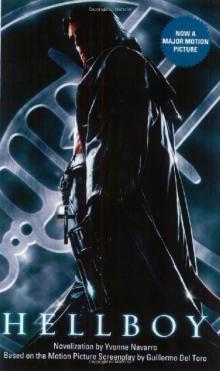 Hellboy
Hellboy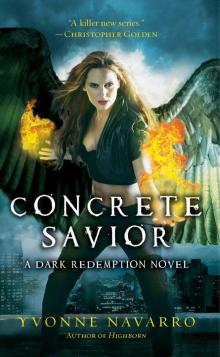 Concrete Savior
Concrete Savior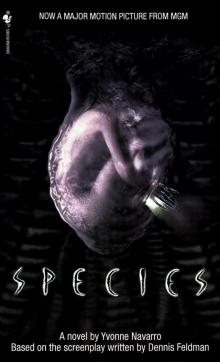 Species
Species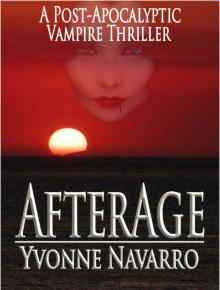 AfterAge
AfterAge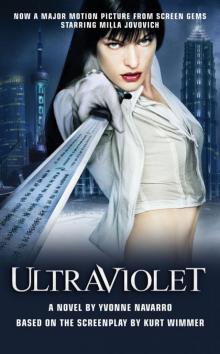 Ultraviolet
Ultraviolet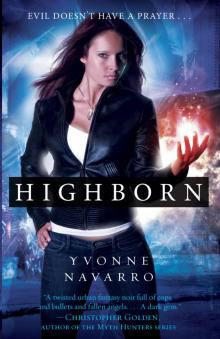 Highborn
Highborn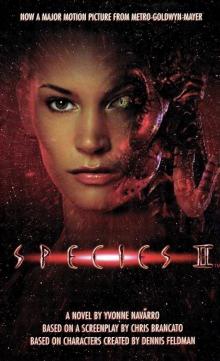 Species II
Species II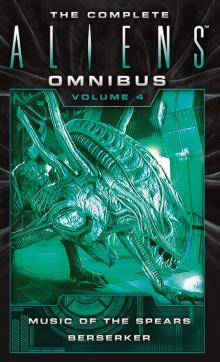 Aliens Omnibus 4
Aliens Omnibus 4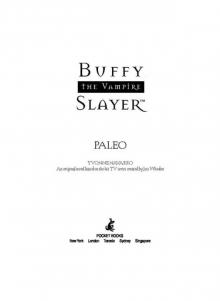 Paleo
Paleo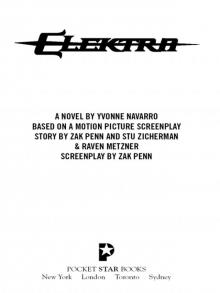 Elektra
Elektra